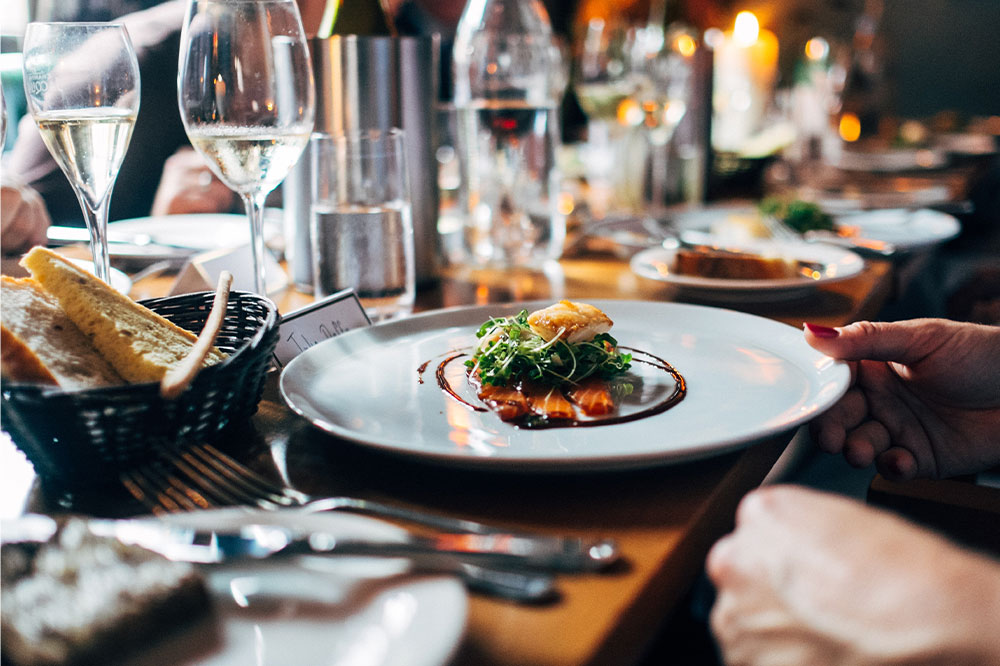Helpful Dinner Table Setting Tips for Beginners
Setting a dinner table is a crucial party trick that can take a holiday family dinner or baby shower brunch to the next level. Although it is not a complicated task, it can get confusing if the setting goes from casual to formal. Also, when there are too many courses, you will be confused about which order the spoons, forks, and plates must go. Here are some tips for classic table settings everyone should know.
Basic dinner table setting
For weekend breakfast or brunch at home, a basic table setting is all you need. It works well for everyday sit-down dinners with your family or friends.

- The placemat goes first on the table.
- The dinner plate has to be placed at the center of the placemat.
- The napkin is set to the left of the plate. Alternatively, it can also be placed on top of the dinner plate. But this can make the setting a little formal.
Casual dinner table setting
The informal or casual setting is perfect for classic dinner parties. They are just a level up from your basic everyday setting without making things too extreme. How you set the table generally depends on your style, the course you are serving, and the dishware, glassware, and cutlery you have. Here’s how you can do it-
- Put the placemat on the table for each guest.
- The dinner plate goes to the center of the placemat.
- The salad plate is placed on top of the dinner plate.
- A soup bowl goes on top of the salad plate.
- A napkin is placed to the left of the dinner plate.
- An entree fork is placed to the left of the plate on the napkin.
- A salad and appetizer fork is placed to the left of the entree fork on the napkin.
- To the right of the plate, an entree knife can be placed with the blade facing toward the plate.
- A salad and appetizer knife can be placed to the right of the entree knife. You can swap this out for a spoon too.
- Place the water glass right above the entree knife.
- A wine glass can be placed to the right, slightly higher than the water glass.
- A dessert spoon is followed by a dessert fork. The head of the spoon should be facing towards the bread plate, and the head of the fork should be facing the water wine glass.
For a casual setting, it is not necessary to use all utensils listed above. Furthermore, if things are too cluttered, skip the cutlery for dessert. Bring them out only when dessert is being served.
Formal dinner table setting
A formal dinner table setting looks more complex mainly because it involves several courses, usually more than three. However, this one is relatively easy if you have mastered the casual table setting. It just involves the use of a couple of extra cutlery and glasses. Moreover, there would be many variations in the table setting depending on the order in which you serve the courses. Here’s a common way to set a formal dinner table-
- Place an ironed and clean ironed tablecloth on the table. Pick a subtle design that suits a formal setting.
- A charger plate is placed for each guest. These are large, decorative plates that are placed as a base for other dinnerware. They are also called service plates or under plates.
- Place a soup bowl or salad plate in the middle of the charger plate. Once the soup or salad course is done, you can replace it with the dinnerware for the next course.
- A bread plate with a butter knife placed on it is kept to the top left of the charger plate. The blade of the knife should be facing inwards with the handle towards the right.
- To the charger’s left, you can place a napkin. It can also go in the center of the charger.
- An entree fork is placed to the left of the charger. Place the salad fork toward the outside, to the left of the entree fork.
- To the charger’s right, place the entree knife with the blade facing in. To its right, you can place the soup spoon or the salad knife, depending on which course is being served first.
- All the cutlery, such as the forks, knives, and spoons placed vertically, must be spaced evenly, at least half an inch apart. Also, ensure the bottom of each cutlery is aligned with the bottom of the charger.
- Above the charger, place the dessert spoon with the handle towards the right.
- Place the water glass above the entree knife, soup spoon, and salad knife.
- A place card with a guest’s name can be set above the dessert spoon.

